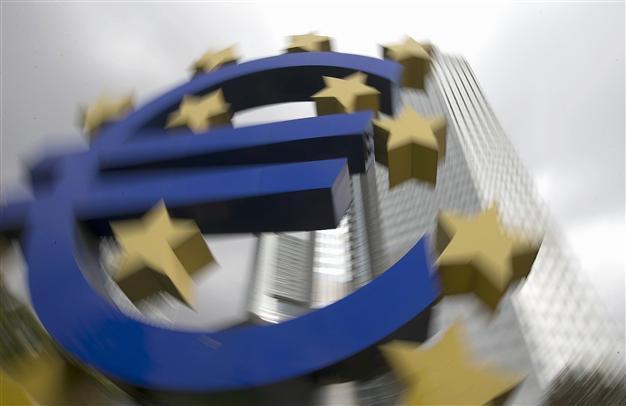Euro falls to 9-year low, Greece and ECB in focus
LONDON/PARIS-Reuters

A euro logo sculpture stands in front the headquarters of the European Central Bank (ECB) in Frankfurt in this October 26, 2014 file photo. AFP Photo
The euro slumped to a nine-year low Jan. 5 as investors bet that the prospect of inflation across the region turning negative and mounting political uncertainty in Greece will force the European Central Bank to unleash quantitative easing.European shares were volatile, initially falling sharply before rebounding into positive territory within an hour of the open as investors digested the implications of the weak euro and yet another hefty slide in oil to a 5-1/2 year low. The euro fell to $1.18605 in early Asian trading yesterday, its weakest level since March 2006. In early European trade it was at $1.1964, down 0.3 percent from late U.S. trade on Jan. 2.
Investors betting that the ECB will take the plunge very soon and open up a bond-buying program like the U.S., UK and Japanese central banks have done were emboldened by an interview ECB president Mario Draghi gave to German financial daily Handelsblatt on Jan. 2.
He said the risk of the Central Bank not fulfilling its mandate of preserving price stability was higher now than half a year ago. Economists forecast that eurozone consumer prices fell 0.1 percent in December, the first decline since 2009. That should fan expectations the ECB will ease policy as soon as Jan. 22, when it holds its first policy meeting of the year.
Grexit fears resurge
Greek politics were at the forefront of market thinking yesterday as the debate around the possibility of elections later this month resulting in the country leaving the euro zone picked up again.
French President Francois Hollande said yesterday countries including Spain and Greece had paid a heavy price to stay in the euro and it was “up to the Greeks” to decide whether to now remain a part of the single currency.
His comment in an interview with France Inter radio came in reaction to a media report at the weekend that said the German government believed the euro zone would now be able to cope with Greece leaving the euro.
The German government wants Greece to stay in the euro zone and there are no contingency plans to the contrary, Vice Chancellor Sigmar Gabriel said on Jan. 4, responding to a media report that Berlin believes the currency union could cope without Greece.
“As for Greece remaining in the eurozone, Greece alone can decide,” Hollande said.
“At this time we should not hypothesize about whether, according to the Greek vote, they would not or would still be a member of the euro zone. The Greeks are free to determine their own destiny.”
The question of Greece’s continued membership in the euro zone has come into focus ahead of the Jan. 25 parliamentary election that left-wing opposition party Syriza, which has promised to end austerity policies if elected, is seen winning.
Syriza leader Alexis Tsipras said in December his party would ask Europe to erase a big portion of its debt.
















